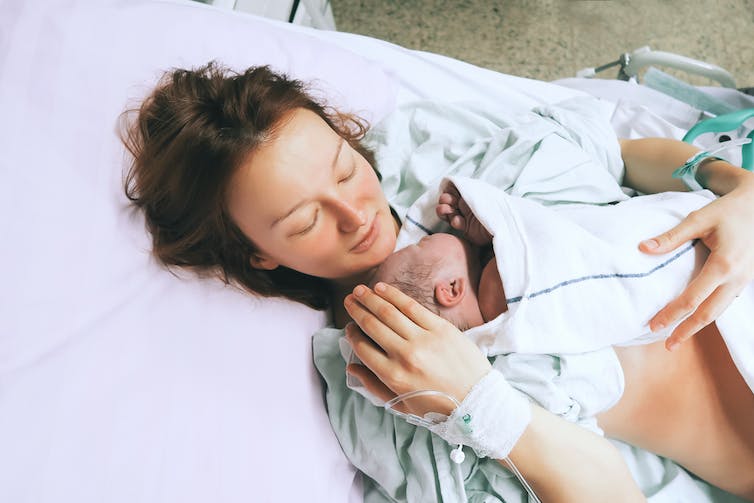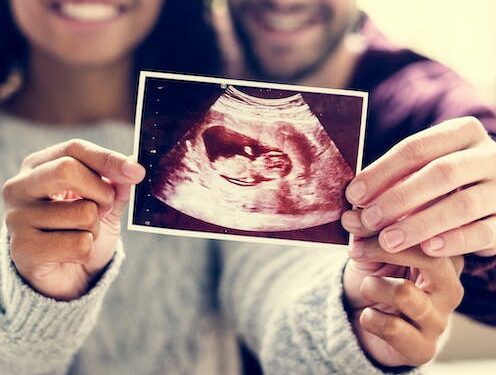
When a baby is born, its immune system is already developed to survive in a world full of germs. This developmental process is not only important for the baby but also for lifelong health. However, our understanding of the process is vastly incomplete. Specifically, scientists do not agree on when the foetus is first exposed to microbes.
Historically, the scientific view was that the foetus, as well as the womb in which the foetus grows, including the placenta and the amniotic fluid (the liquid surrounding the foetus), are sterile. Yet since the arrival of DNA sequencing, several research groups found evidence for microbial communities in the placenta and amniotic fluid.
Some scientists suggested that these microbiomes (communities of bacteria, fungi and viruses) are part of a natural pregnancy and that they expose the foetus to live microbes that prime its immune system. But a new review published in Nature, involving myself and an international team of 45 other experts, has found no sound evidence for such a microbiome.
An entire research field has grown up around this area that goes beyond the description of supposed microbial communities in the womb and into speculation on their potential medical importance. Tens of millions of euros have been spent researching this and hundreds of papers published.
Not all scientists have shared the excitement, though. Counter arguments were put forward quite early on that a foetal microbiome would not be possible because of what we know about human biology.
For example, we know that the placenta is full of anatomical and immunological barriers that prevent microbes from entering and colonising it. We also know that the foetus’s developing immune system would be unable to control the microbes.
Scepticism was supported by an increasing number of studies which showed that the microbial DNA detected in the placenta and amniotic fluid was due to contamination of the samples, research devices, and the reagents (chemical ingredients) used to isolate the DNA from the samples.
A lively scientific debate arose with views that were pretty much irreconcilable. The controversy culminated when four studies, published in 2020 and 2021 in respected scientific journals, studied the microbes in the human foetus directly through DNA sequencing and came to opposite conclusions.
Two found viable microbial populations in the intestines and organs of vaginally delivered foetuses and linked these microbes to the development of the immune system. The other two reported no evidence for microbes.
Such uncertainties on a fundamental issue pose a substantial challenge for scientific progress, for example, by diverting finite resources into research that results in no advancement for the health of babies and their mothers. There is also the risk of misguided attempts to therapeutically modify microbiomes that don’t exist.
To resolve the debate, our team assessed the evidence and reviewed all aspects of the contradictory data. Given the controversy, we aimed to approach the problem from different angles. We included experts in all the scientific disciplines important to the debate, specifically reproductive biology, microbiology, data science, immunology, clinical microbiology and gnotobiology (the study of germ-free plants and animals). We were interested in a balanced approach, so more than half of the scientists involved had no previous involvement in the debate.

Natalia Deriabina/Shutterstock
Unanimously refuted
The team unanimously refuted the concept of a foetal microbiome and concluded that the detection of microbes in foetal tissues was due to contamination of samples drawn from the womb, reagents or research devices.
A systematic comparison of the bacterial communities detected in foetuses delivered vaginally versus through caesarean section established that most contamination occurred during vaginal sampling. The experts further concluded that the existence of live microbes in healthy foetal tissues is not compatible with fundamental concepts of reproductive biology, immunology, clinical microbiology, and the ability to derive germ-free mammals.
We are hopeful that the consensus among the experts we assembled provides guidance for future research. It establishes a solid scientific foundation to concentrate research efforts where they will be most effective.
It is still important to discover how the immune system of the foetus develops. But knowing that the foetus is sterile shifts the emphasis away from live microbes towards the cell components of microbes and the chemicals (metabolites) they produce. Such compounds have been shown to cross the placenta to prepare the foetus’s immune system for life in a germ-filled world.
Our new paper clarifies that babies are colonised by microbes during birth and thereafter. Efforts to modulate microbiomes to improve infant and lifelong health should therefore be focused on the period after birth.
![]()
Jens Walter receives funding from by Science Foundation Ireland (SFI) through a Centre award (APC/SFI/12/RC/2273_P2) to APC Microbiome Ireland and an SFI Professorship (19/RP/6853)






























